By
Ricardo Rocha, University of Porto and
Tran Cao Son, New Mexico State University
The 33rd edition of the International Conference of Logic Programming (ICLP 2017) took place in Melbourne, Australia from the 28th of August to the 1st of September, 2017. ICLP 2017 was co-located with the 23rd International Conference on Principles and Practice of Constraint Programming (CP 2017) and with the 20th International Conference on Theory and Applications of Satisfiability Testing (SAT 2017). This was the first time ever that these 3 conferences were co-located.
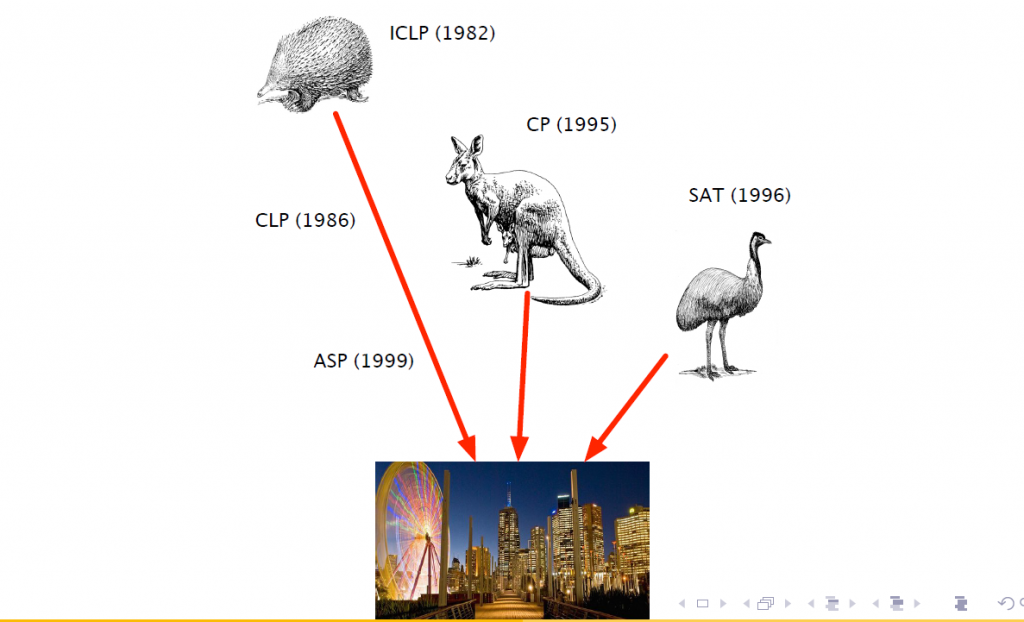
Conference paths leading to Melbourne
(pic from one invited presentation)
The 3 conferences and its affiliated events attracted about 200 participants to the Melbourne Convention and Exhibition Centre, the venue of the event located on the banks of the iconic Yarra River in Melbourne’s South Wharf.
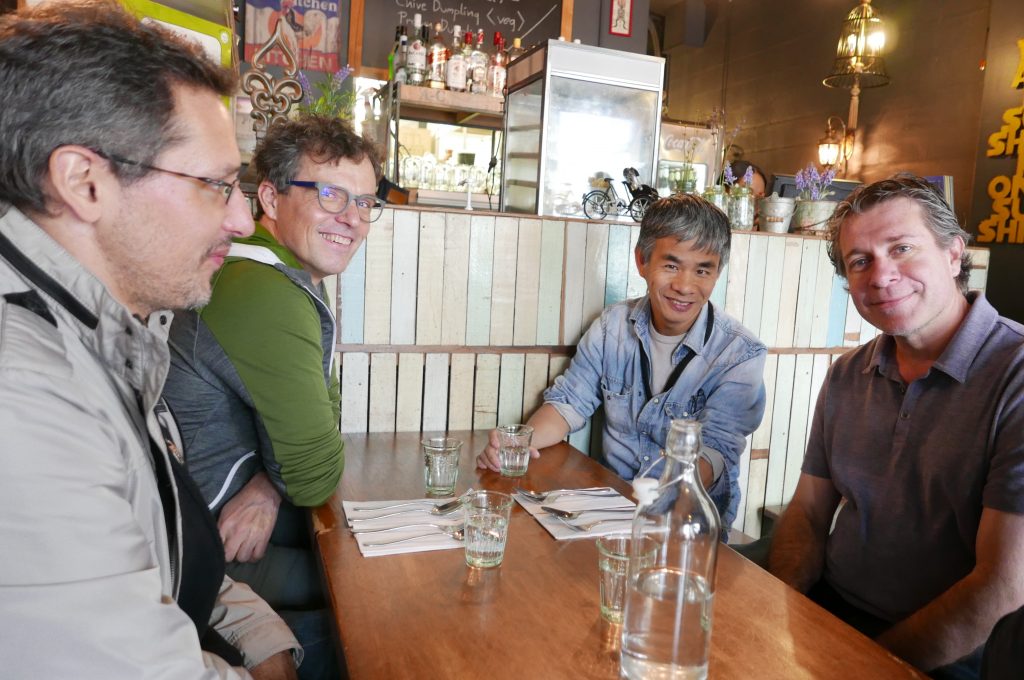
The PC chairs, the president, and one invited speaker
ICLP 2017 featured a number of exciting events. In addition to the presentations of 21 regular papers and 11 technical communications, the agenda included 5 invited talks, 4 tutorials, 2 Test-of-Time award presentations, a session in honour of Alain Colmerauer, 7 pre-conference workshops, selected by the workshop chairs Charlotte Truchet, Enrico Pontelli and Stefan Ruemmele, a joint ICLP/CP/SAT Doctoral Program, chaired by Neda Saeedloei and Christopher Mears, and the traditional programming competition, organized by Paul Fodor and Graeme Gange. All the invited talks and tutorials were common to the agendas of ICLP, CP and SAT.
The invited talks were given by:
- Holger H. Hoos, on the topic `The best of both worlds: Machine learning meets logical reasoning’
- Mark Wallace, on the topic `Constraints and the 4th Industrial Revolution’
- Enrico Pontelli, on the topic `Back to the Future – Parallelism and Logic Programming’
- Nina Narodytska, on the topic `Recent advances in Maximum Satisfiability’
- Agostino Dovier, on the topic `The role of SAT, CP, and Logic Programming in Computational Biology’
and the tutorials by:
- Pietro Belotti, on the topic `Mixed Integer Nonlinear Programming’
- Armin Biere, on the topic `Introduction to SAT’
- Guido Tack, on the topic `Introduction to Constraint Programming’
- Tias Guns, on the topic `Machine Learning and Data Science’
As in the recent editions of the conference, a Test-of-Time award was given to the most influential papers from the ICLP conferences of 20 and 10 years ago.
The paper `Hybrid Probabilistic Programs’, accepted in ICLP 1997, Leuven, Belgium, by Alex Dekhtyar and V.S. Subrahmanian was awarded the 20 years Test-of-Time Award. Alex Dekhtyar received the award and presented the work in a dedicated session.
The paper `User-Definable Resource Bounds Analysis for Logic Programs’, accepted in ICLP 2007, Porto, Portugal, by Jorge Navas, Edison Mera, Pedro Lopez-Garcia, and Manuel V. Hermenegildo was awarded the 10 years Test-of-Time Award. The two authors Pedro Lopez-Garcia and Manuel V. Hermenegildo received the award and presented the work together in a dedicated session.
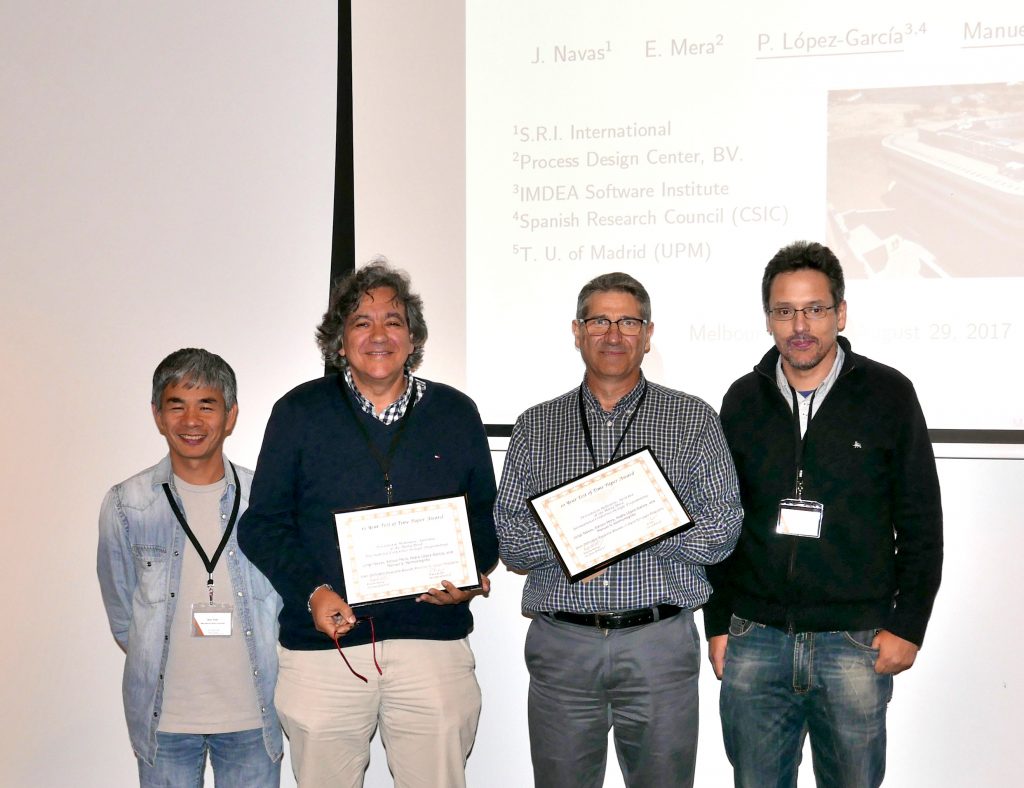 Test of time Award: 10 years |
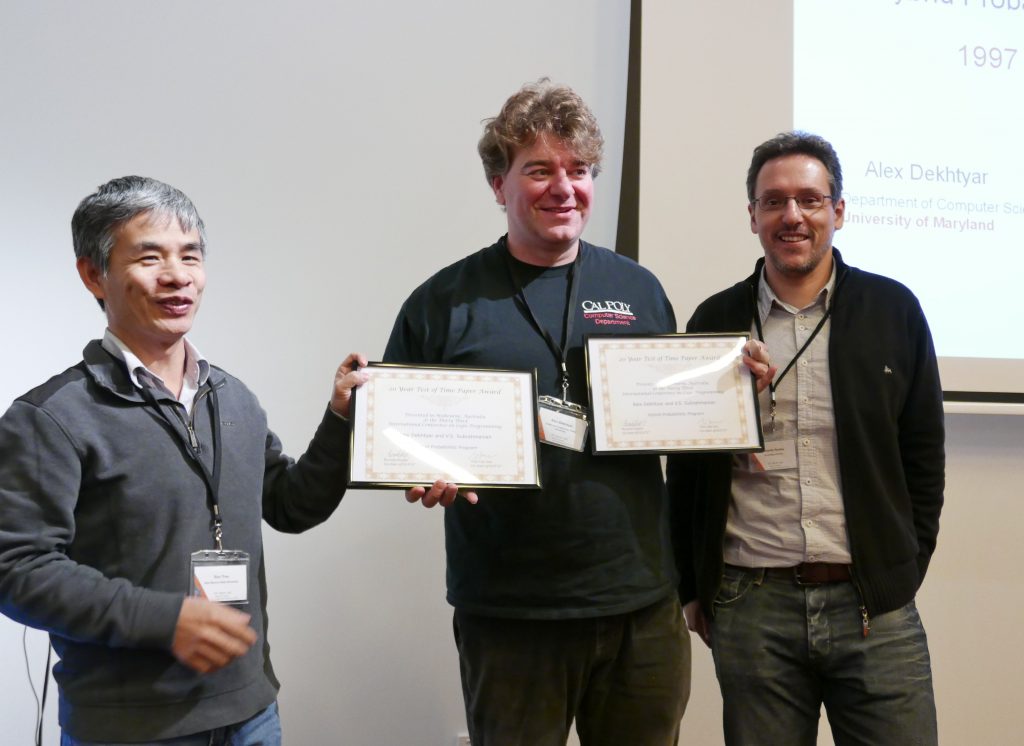 Test of time Award: 20 years |
From the 21 regular papers accepted, two best papers were selected by the Program Committee. The paper `The Intricacies of 3-Valued Extensional Semantics for Higher-Order Logic Programs’, by Panos Rondogiannis and Ioanna Symeonidou, was awarded the ICLP 2017 Best Paper. The paper `Finite model reasoning over existential rules’, by Giovanni Amendola, Nicola Leone and Marco Manna, was awarded the ICLP 2017 Best Student Paper. These papers were presented by Ioanna Symeonidou and Giovanni Amendola, respectively.
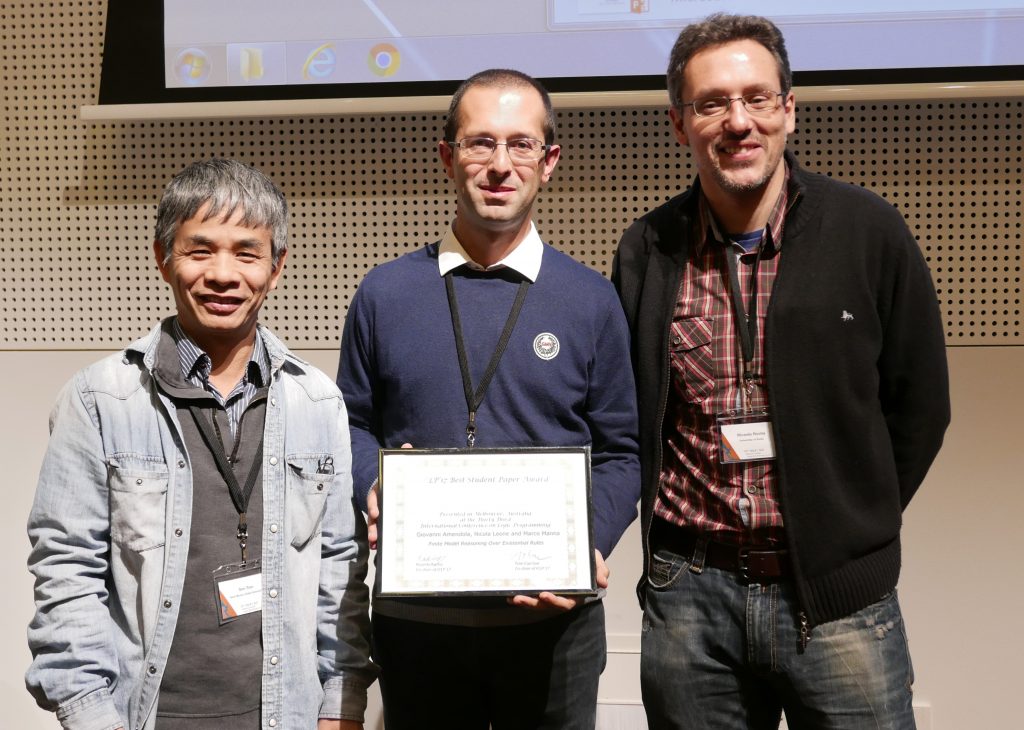 Best student paper award |
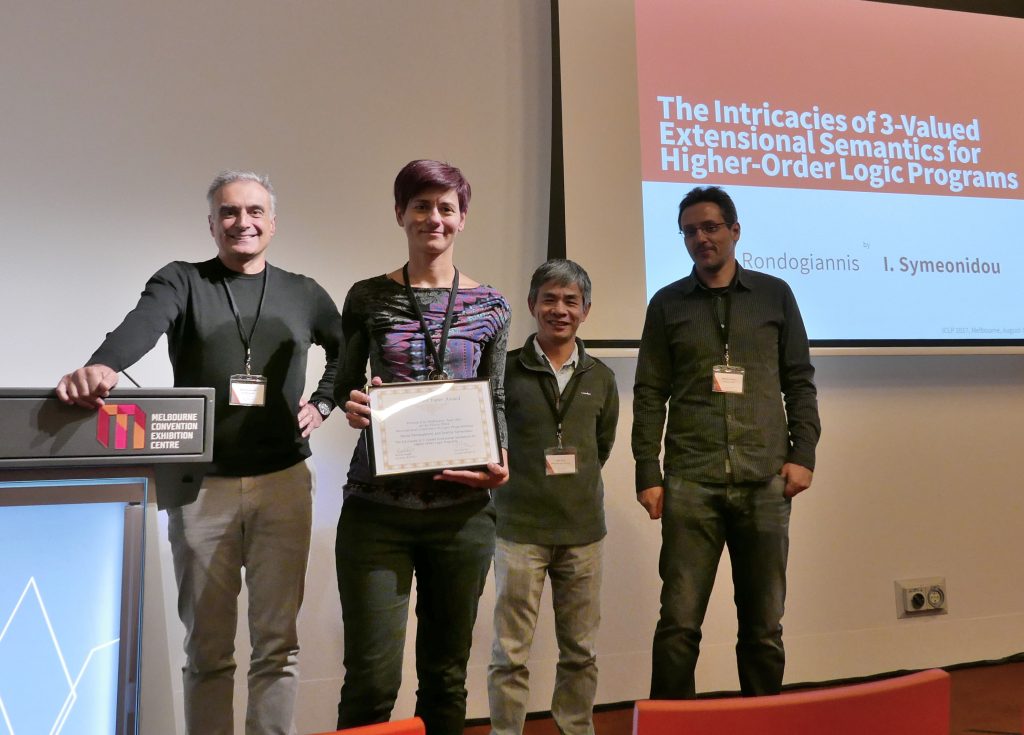 Best paper award (and one intruder) |
At the joint ICLP/CP/SAT Doctoral Program, 4 LP-related PhD students presented their thesis work. The presentation by Bernhard Bliem, entitled `Treewidth in Non-Ground Answer Set Solving and Alliance Problems in Graphs’ was selected the best Doctoral Program LP-related contribution, which was given the opportunity to be presented in a slot of the main conference.
In addition to all the exciting events mentioned above, the conference also included several joint ICLP/CP/SAT social events, an opening reception with drinks, canapès and a lovely presentation by Colette Colmerauer about Alain Colmerauer’s pioneering work on Prolog and CP, the conference banquet at the wonderful Sea Life Melbourne Aquarium, and a selection of 3 exciting guided tours to Melbourne’s world-renowned street art, to the Australian Collection of the National Gallery of Victoria, and to the Sea Life Melbourne Aquarium.
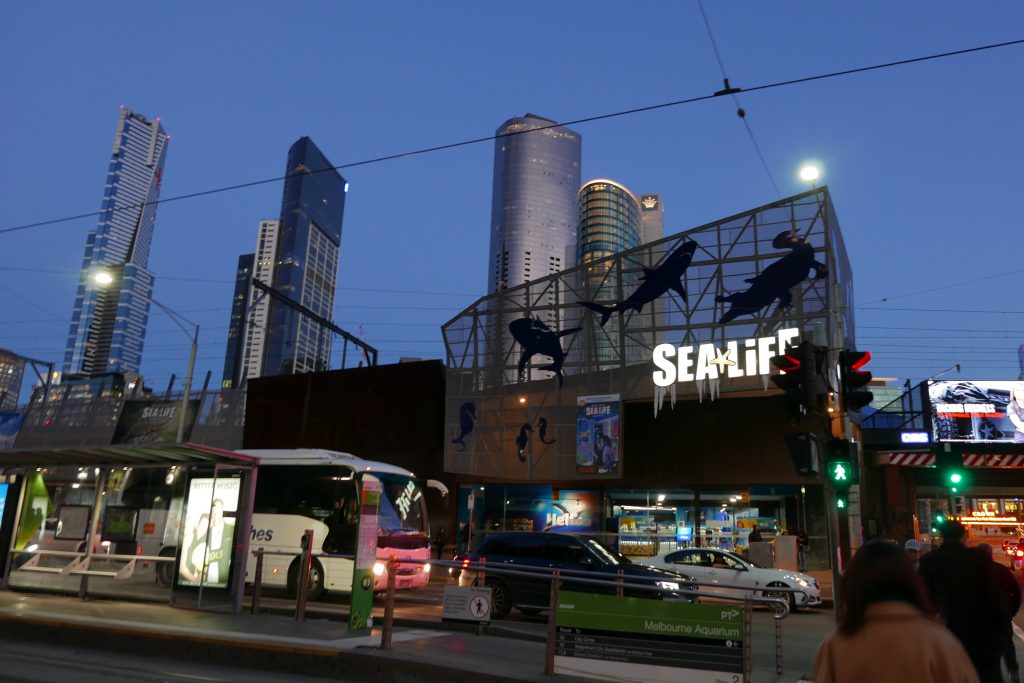
We believe that all the participants enjoyed the event and the co-location with CP and SAT was highly appreciated. Maria Garcia de la Banda, Guido Tack and their team were great hosts and made the event a memorable edition in Melbourne. Thanks should go also to the authors of all submitted papers for their contribution to make ICLP alive and to the participants for making the event a meeting point for a fruitful exchange of ideas and feedback on recent developments. We are looking forward to the next edition, which is scheduled to be in Oxford, UK, as part of FLoC.
